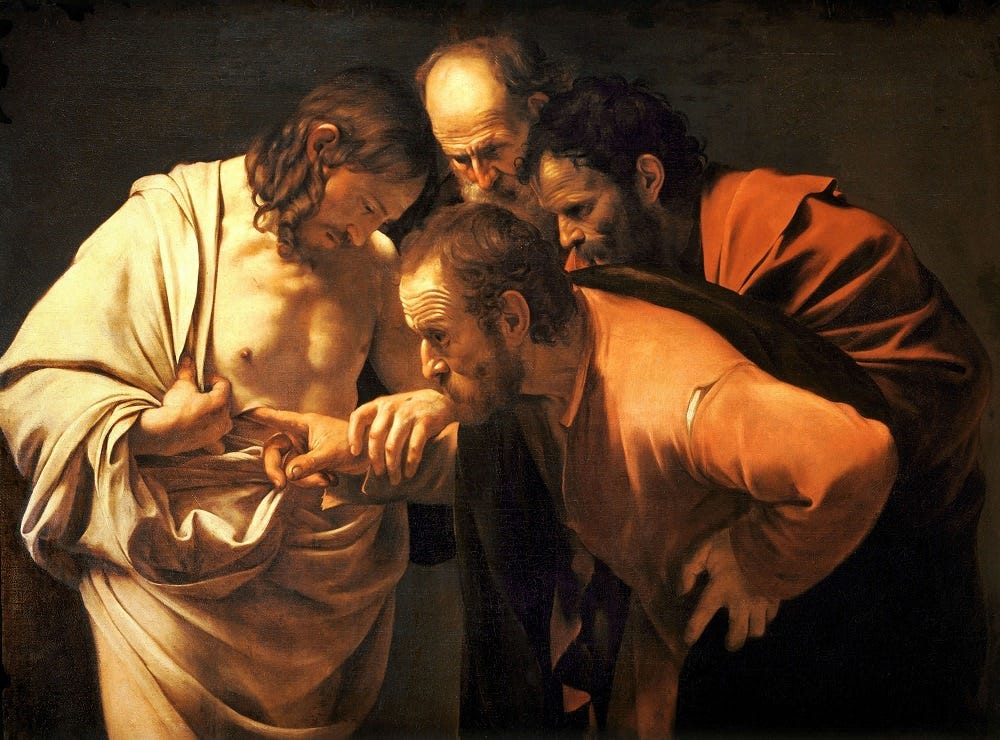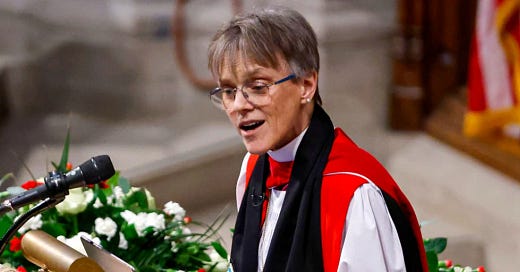
I love Love is Blind. It is junk, reality TV in its truest form. The simple premise—a dating show where you can’t see your potential partner until you’re engaged and then have two weeks before making your vows at the altar—is ripe for drama, betrayal, unexpected turns, and unlikely heroes. All of this together creates the cultural “tea” that can consume hours of conversation, endless TikTok theories of TMZ-like speculation, and cultural moments that carry on for years to come.
I am under no (d)illusion that I am even remotely thinking theologically when I watch the show. My main takeaway each season is a reaffirmed belief that, in the scope of our whole society, I’m fairly normal (and glad to be so).
However, the airing of this current Love Is Blind season alongside the liturgical seasons of Lent and Eastertide has led to some theological musings about the relationship between seeing and loving:
The scene of Doubting Thomas in the Gospel of John has fascinated me for many years now. When I first encountered Carvaggio’s depiction of this encounter in Shelly Rambo’s book Resurrecting Wounds, I was captivated by it.
As I’ve continued to reflect on the piece, I’ve grown in compassion for Thomas, who needed to experience a post-resurrected Jesus with his senses. His doubt, to me, does not signify his unfaithfulness to Christ but his desire for the resurrection to be true.
There is Thomas, the gumshoe.
Bracing himself with a hand on his hip as he inquisitively leans in for a closer inspection. He is confused, fearful, and doubting. Just a week ago he stated with confidence, “Unless I see the mark of the nails in his hands, and put my finger in the mark of the nails and my hand in his side, I will not believe.” (John 20:25).
Here stands his dear friend—a companion who now walks through walls and beyond gates of death.
Neither entirely corporeal nor a translucent ghost, Jesus appears before Thomas in a liminal space between resurrection and ascension.
But, like many modern and scientific-minded Christians today, Thomas knew that crucified and entombed bodies do not just get up and walk again. He may have believed with all his heart that Jesus was who he claimed to be, but seeing his dear companion mangled beyond recognition, hung on a cross, and enclosed in a stone tomb, I’m sure, reverberated through his mind. How does one resurrect from such trauma? It is an impossible feat.
The memorable line from this interaction comes from the resurrected Christ who, upon appearing to Thomas and granting his wish, says, “Have you believed because you have seen me? Blessed are those who have not seen and yet have come to believe” (20:29).
The premise of Love is Blind is built on a similar notion—that love (and the belief attached to it) shouldn’t be conditioned by what we can see. As participants talk in the “pods” where they can hear but are deprived of their remaining senses, their love is supposed to grow in a deeper way than the superficiality of modern love.
Of course, what we quickly find is that, unlike Jesus, we are not so reliable. (Even Netflix, the creators of the show, couldn’t hold to their promise to broadcast the first-ever live reunion). The trust and love that is built on words alone rarely represent what happens after the couples see one another and attempt to live life as a couple. As viewers, we gain the omnipotent eye that can see what the contestants cannot…at least, that is what the producers want us to think (hence, the tea).
I think this same premise is what makes Jesus’ response to Thomas so difficult. Jesus’ blessing of those who believe without seeing goes against our experience as humans. Like Thomas, we need to see because trusting words apart from tangible, material experience leaves us incredibly vulnerable. In real life, we don’t have the all-seeing eye that gives us access to absolute knowledge. Instead, we have faith.
For most Christians today, our encounters and relationship with God are not immediately material. Jesus has not sat next to me on my weekly train ride to Chicago or tapped me on the shoulder when I was in a seminary course. Instead, God’s love and presence are revealed through the warmth of the sun setting, the taste of a delicious meal, the embrace of a loved one, or even the overwhelming sense of gratitude that comes in the middle of a three-hour lecture on Christology.
To be clear, I don’t think that belief in God and following in the way of Jesus is “blind faith.” We have good reason to believe that the God revealed to us through the Scriptures is good and worthy of our love and trust. God-willing we also have personal experiences to support what the Scriptures attest to. Thomas, too, had good reason to trust that Jesus resurrected again because of all he did tangibly experience as his disciple.
But our faith in and love for Christ, even when we cannot directly experience God through conventional means of relating, is worthy of our trust because it is a qualitatively different kind of relationship.
Unlike the contestants on Love is Blind pining for their 15 minutes of fame or a marital partner, the love shared between Jesus and his followers is far from blind because the omnipotent God sees us at the deepest core of our being (Psalm 139). As Creator, God has loved us eternally before we ever had the capacity to see or love in return (Jeremiah 31:3). As Lord and Savior, Christ has come incarnate to reveal God’s divine purposes in the world and confer the righteousness of God upon us. This is not the relationship of two strangers looking for marital love, but of a divine Creator beckoning creation to draw near to their Maker.
For these reasons and many more, may we recognize that “For now we see only a reflection, as in a mirror, but then we will see face to face. Now I know only in part; then I will know fully, even as I have been fully known. And now faith, hope, and love remain, these three, and the greatest of these is love” (1 Corinthians 13).
Reading:
Yanan Melo, “Navigating American Evangelicalism as a Filipino Immigrant”(Interfaith America)
Andrew Whitehead, American Idolatry: How Christian Nationalism Betrays The Gospel and Threatens the Church (Brazos, 2023)
John Inazu, “My Q&A with Theologian Stanley Hauerwas” (
)
Watching:
“Does Institutional Christianity Have a Future?” (w/Heath Carter, Russell Moore, & Adam Russell Taylor) in Princeton Seminary’s Future of American Democracy Series (Youtube).
I Think You Should Leave (with Tim Robinson) (Netflix)













